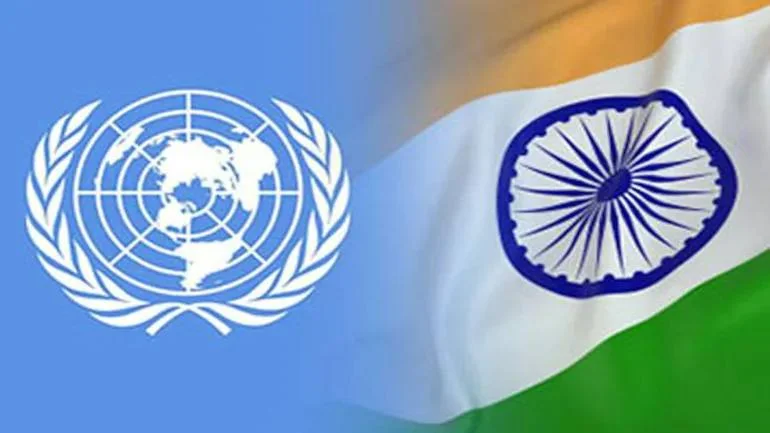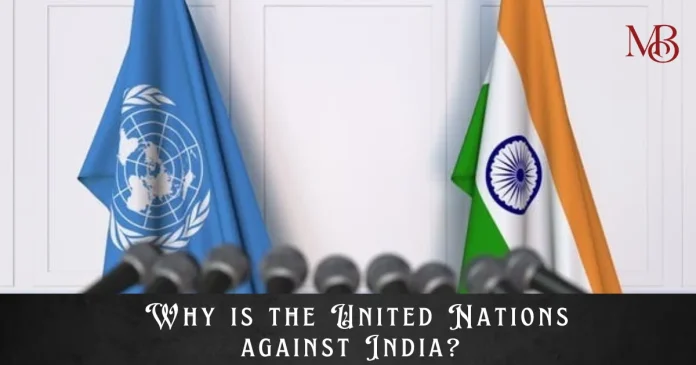United Nations against India: The perception that the United Nations (UN) is “always against India” has gained traction in certain circles, especially following contentious debates on issues like Kashmir, human rights, and international security. However, a deeper analysis reveals that this perception may not accurately reflect the broader relationship between India and the UN. The UN is a multilateral institution representing the interests of 193 member states, and its actions are often shaped by complex geopolitical factors. This article explores the origins of this perception, key incidents contributing to it, and why the relationship between India and the UN is far more nuanced.
United Nations against India: Origins of the Perception
The belief that the UN holds an unfavorable stance toward India largely stems from historical conflicts and ongoing geopolitical rivalries. Which makes feel like the United Nations against India. This section looks into key issues that have shaped this perception, beginning with the longstanding Kashmir dispute.
1. The Kashmir Dispute
The Kashmir conflict is perhaps the most significant factor contributing to the belief that the UN is biased against India. In 1947, following the partition of British India, the princely state of Jammu and Kashmir became a flashpoint between India and Pakistan. Pakistan-backed tribal militias invaded the region, prompting Maharaja Hari Singh to accede to India. This led to the first Indo-Pakistani war.
In 1948, India took the matter to the UN, resulting in the adoption of UN Security Council Resolution 47, which called for a plebiscite to determine the future of Jammu and Kashmir. However, the plebiscite was contingent on Pakistan withdrawing its troops, which did not occur. India maintains that subsequent bilateral agreements, such as the Simla Agreement (1972) and the Lahore Declaration (1999), supersede UN resolutions and make the dispute a bilateral issue.
Despite India’s stance, Pakistan frequently raises the Kashmir issue at the UN General Assembly and the Human Rights Council, often with support from China and other allies. This repeated internationalization of Kashmir reinforces the perception that the United Nations against India.
2. Human Rights Reports
Over the years, the UN High Commissioner for Human Rights (OHCHR) has published reports criticizing alleged human rights violations in Jammu and Kashmir. For example, in 2018 and 2019, the OHCHR released reports highlighting excesses by Indian security forces, including arbitrary arrests and excessive use of force.
India rejected these reports, calling them “fallacious, tendentious, and motivated.” The Ministry of External Affairs (MEA) argued that the reports ignored the context of cross-border terrorism and the actions of Pakistan-based militant groups. India’s diplomatic protest underscored the belief that the UN often adopts a narrative influenced by adversarial nations.
Is the UN Against India? A Closer Look at India’s Role on the Global Stage
United Nations against India: The Broader Relationship
While contentious issues grab headlines, they overshadow India’s significant contributions to the UN and the broader alignment between India’s foreign policy and UN objectives.
1. Peacekeeping Operations
India is one of the largest contributors to UN peacekeeping forces, having deployed over 260,000 troops across 49 missions since 1948. Indian peacekeepers are renowned for their professionalism and commitment to maintaining peace in conflict zones such as South Sudan, Lebanon, and the Democratic Republic of the Congo.
As of 2023, over 5,500 Indian troops were serving in UN missions, reflecting India’s dedication to global peace and security. Additionally, India has lost more than 175 peacekeepers, the highest of any nation, underscoring the sacrifices made.
2. Sustainable Development Goals (SDGs)
India is a key player in advancing the UN’s Sustainable Development Goals (SDGs). The country has made significant progress in areas such as poverty reduction, education, and renewable energy. For instance, the “Saubhagya” scheme successfully provided electricity to 28.6 million households by 2019, contributing to SDG 7 (Affordable and Clean Energy).
India’s leadership in renewable energy, particularly through the International Solar Alliance (ISA), co-founded by India and France in 2015, demonstrates its commitment to SDG 13 (Climate Action). The ISA, endorsed by over 110 countries, aims to mobilize $1 trillion in solar investments by 2030.
3. Global Health Initiatives
India played a pivotal role in the global fight against COVID-19 by supplying vaccines to over 100 countries through the “Vaccine Maitri” initiative. This aligns with SDG 3 (Good Health and Well-Being) and underscores India’s commitment to equitable global health.

United Nations against India: The Push for Permanent Membership
India’s aspiration for a permanent seat on the UN Security Council (UNSC) is another area of contention. India argues that the current composition of the UNSC, dominated by the P5 (China, France, Russia, the UK, and the US), reflects post-World War II geopolitics and does not represent contemporary realities.
India’s credentials for permanent membership are strong:
- Population: India is the world’s most populous country (surpassing China in 2023).
- Economy: It is the fifth-largest economy globally, with a GDP of $3.7 trillion in 2023.
- Peacekeeping: As highlighted, India is a top contributor to UN peacekeeping missions.
Despite widespread support from nations such as the US, France, and Russia, China has consistently blocked India’s bid, citing regional tensions and the need for consensus among P5 members.
United Nations against India: Counter-Terrorism and Diplomatic Wins
India’s engagement with the UN has yielded significant diplomatic victories, particularly in counter-terrorism. After years of lobbying, the UN designated Pakistan-based terrorist Masood Azhar as a global terrorist in 2019 under the 1267 sanctions regime. This marked a significant win for India’s counter-terrorism efforts.
Additionally, India chairs the UN Counter-Terrorism Committee for the 2022-23 term, reflecting its leadership in combating global terrorism.
Geopolitical Realities: Influence of Rival Nations
One of the primary reasons for unfavorable UN resolutions is the influence of rival nations. Pakistan and China, both of whom have contentious relationships with India, often leverage their positions in UN bodies to criticize India. For example:
- China’s Veto Power: China has repeatedly used its veto power to block India’s attempts to list terrorists under the 1267 sanctions committee.
- Pakistan’s Alliances: Pakistan actively lobbies Muslim-majority nations and the Organization of Islamic Cooperation (OIC) to raise the Kashmir issue at the UN.
However, India counters this through strategic alliances with the US, Japan, Australia (Quad alliance), and European nations, ensuring a balanced approach.
United Nations against India: A Multifaceted Relationship
The belief that the UN is consistently against India oversimplifies a complex and multifaceted relationship. While geopolitical rivalries sometimes manifest in unfavorable resolutions, India’s substantial contributions to peacekeeping, sustainable development, and global health underscore its pivotal role within the UN framework.
You might also like: 04 December, Allu Arjun Incident is a Reminder That Crowd Safety is Everyone’s Responsibility
United Nations against India: India’s ongoing push for Security Council reform, leadership in climate initiatives, and diplomatic wins in counter-terrorism reflect a nation deeply engaged with the UN, striving not for conflict but for a more equitable and representative international order. Follow our Odyssey page for more such articles.


